新概念英语第二册第八课
- 格式:doc
- 大小:84.50 KB
- 文档页数:6
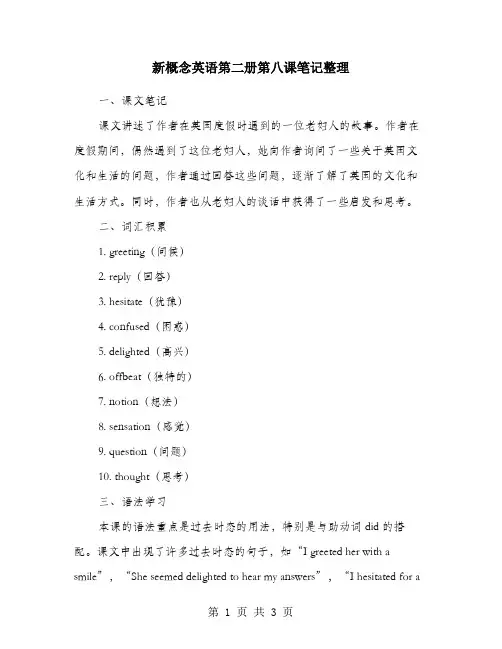
新概念英语第二册第八课笔记整理一、课文笔记课文讲述了作者在英国度假时遇到的一位老妇人的故事。
作者在度假期间,偶然遇到了这位老妇人,她向作者询问了一些关于英国文化和生活的问题,作者通过回答这些问题,逐渐了解了英国的文化和生活方式。
同时,作者也从老妇人的谈话中获得了一些启发和思考。
二、词汇积累1. greeting(问候)2. reply(回答)3. hesitate(犹豫)4. confused(困惑)5. delighted(高兴)6. offbeat(独特的)7. notion(想法)8. sensation(感觉)9. question(问题)10. thought(思考)三、语法学习本课的语法重点是过去时态的用法,特别是与助动词did的搭配。
课文中出现了许多过去时态的句子,如“I greeted her with a smile”,“She seemed delighted to hear my answers”,“I hesitated for amoment before replying”,“I didn't understand her question”,“I thought for a while before answering”等。
通过这些句子的学习,我们可以更好地掌握过去时态的用法和与助动词did的搭配。
四、文化拓展本课涉及到了英国文化和生活方式,我们可以进一步拓展关于英国的历史、文化、风俗等方面的知识。
例如,可以了解英国的传统节日、食物、社交礼仪等。
这些知识不仅有助于我们更好地理解课文,还能拓宽我们的视野,增长我们的见识。
五、口语练习我们可以根据课文内容进行口语练习,例如,可以模拟与老妇人的对话,练习用英语表达自己的想法和感受。
此外,我们还可以结合自己的经历和感受,用英语讲述一些与课文相关的故事或经历,提高自己的口语表达能力和思维逻辑能力。
六、写作模板根据课文内容,我们可以模仿作者的写作方式,写一篇介绍自己家乡或旅行经历的文章。
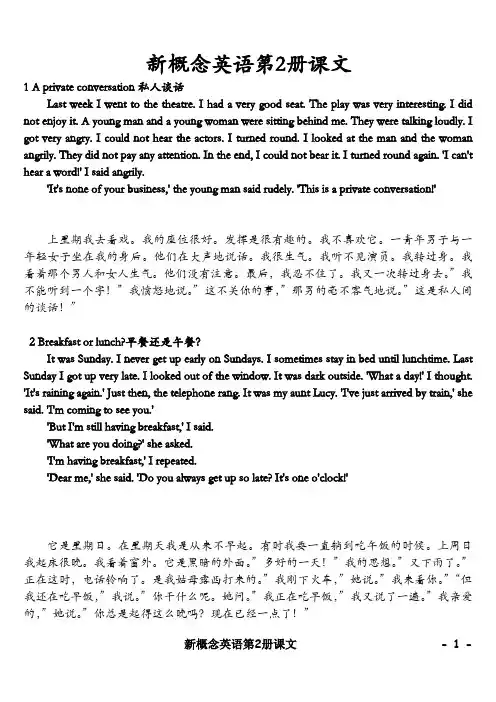
新概念英语第2册课文1 A private conversation私人谈话Last week I went to the theatre. I had a very good seat. The play was very interesting. I did not enjoy it. A young man and a young woman were sitting behind me. They were talking loudly. I got very angry. I could not hear the actors. I turned round. I looked at the man and the woman angrily. They did not pay any attention. In the end, I could not bear it. I turned round again. 'I can't hear a word!' I said angrily.'It's none of your business,' the young man said rudely. 'This is a private conversation!'上星期我去看戏。
我的座位很好。
发挥是很有趣的。
我不喜欢它。
一青年男子与一年轻女子坐在我的身后。
他们在大声地说话。
我很生气。
我听不见演员。
我转过身。
我看着那个男人和女人生气。
他们没有注意。
最后,我忍不住了。
我又一次转过身去。
”我不能听到一个字!”我愤怒地说。
”这不关你的事,”那男的毫不客气地说。
”这是私人间的谈话!”2 Breakfast or lunch?早餐还是午餐?It was Sunday. I never get up early on Sundays. I sometimes stay in bed until lunchtime. Last Sunday I got up very late. I looked out of the window. It was dark outside. 'What a day!' I thought. 'It's raining again.' Just then, the telephone rang. It was my aunt Lucy. 'I've just arrived by train,' she said. 'I'm coming to see you.''But I'm still having breakfast,' I said.'What are you doing?' she asked.'I'm having breakfast,' I repeated.'Dear me,' she said. 'Do you always get up so late? It's one o'clock!'它是星期日。
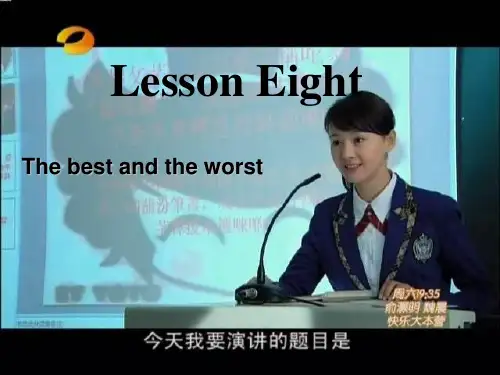
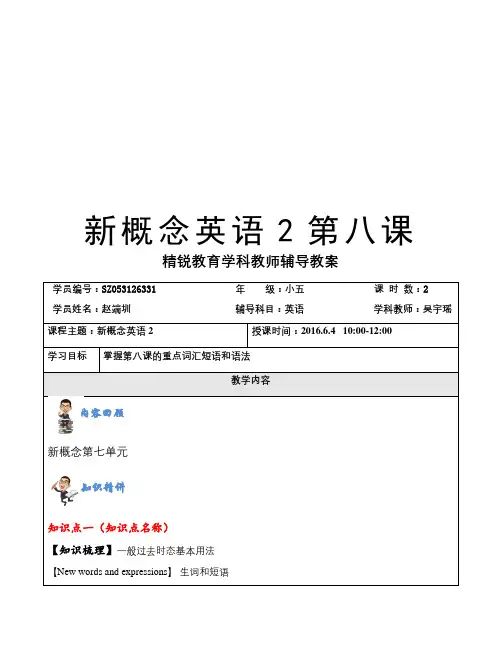
新概念英语2第八课
精锐教育学科教师辅导教案
学员编号:SZ053126331 年级:小五课时数:2
学员姓名:赵端圳辅导科目:英语学科教师:吴宇瑶课程主题:新概念英语2 授课时间:2016.6.4 10:00-12:00
学习目标掌握第八课的重点词汇短语和语法
教学内容
内容回顾
新概念第七单元
知识精讲
知识点一(知识点名称)
【知识梳理】一般过去时态基本用法
【New words and expressions】生词和短语
() 5 By and by, ____ students in our class came to like English.
A. more and more B. much and much C. many and many D. less and least
总结回顾
课后作业
练一练:汉译英
1.我的苹果比你的多。
2. 比尔是这两男孩中较大的一个。
3.北京是中国最大的城市之一。
4. 汤姆是所有男孩中最高的一个。
5.他的英语是班里最棒的。
6. 现在白天变得越来越长了。
7.他越忙,就越高兴。
8. 学英语比学汉语容易。
9.我比约翰小两岁。
10. 上海比日本的任何一个城市都大。
预习内容。
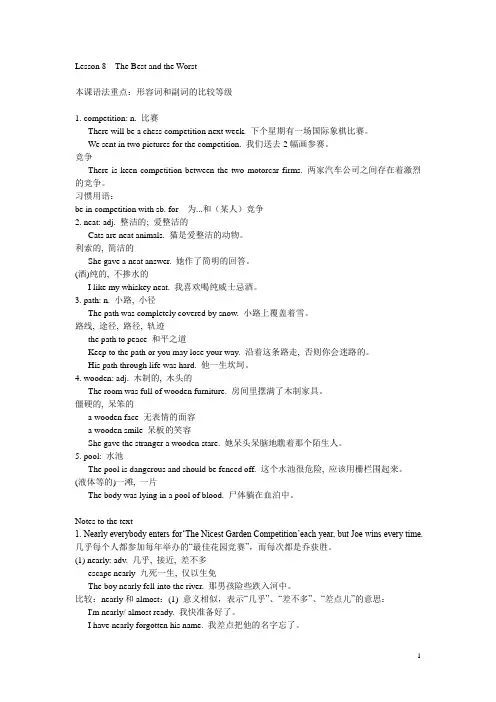
Lesson 8 The Best and the Worst本课语法重点:形容词和副词的比较等级1. competition: n. 比赛There will be a chess competition next week. 下个星期有一场国际象棋比赛。
We sent in two pictures for the competition. 我们送去2幅画参赛。
竞争There is keen competition between the two motorcar firms. 两家汽车公司之间存在着激烈的竞争。
习惯用语:be in competition with sb. for 为...和(某人)竞争2. neat: adj. 整洁的; 爱整洁的Cats are neat animals. 猫是爱整洁的动物。
利索的, 简洁的She gave a neat answer. 她作了简明的回答。
(酒)纯的, 不掺水的I like my whiskey neat. 我喜欢喝纯威士忌酒。
3. path: n. 小路, 小径The path was completely covered by snow. 小路上覆盖着雪。
路线, 途径, 路径, 轨迹the path to peace 和平之道Keep to the path or you may lose your way. 沿着这条路走, 否则你会迷路的。
His path through life was hard. 他一生坎坷。
4. wooden: adj. 木制的, 木头的The room was full of wooden furniture. 房间里摆满了木制家具。
僵硬的, 呆笨的a wooden face 无表情的面容a wooden smile 呆板的笑容She gave the stranger a wooden stare. 她呆头呆脑地瞧着那个陌生人。
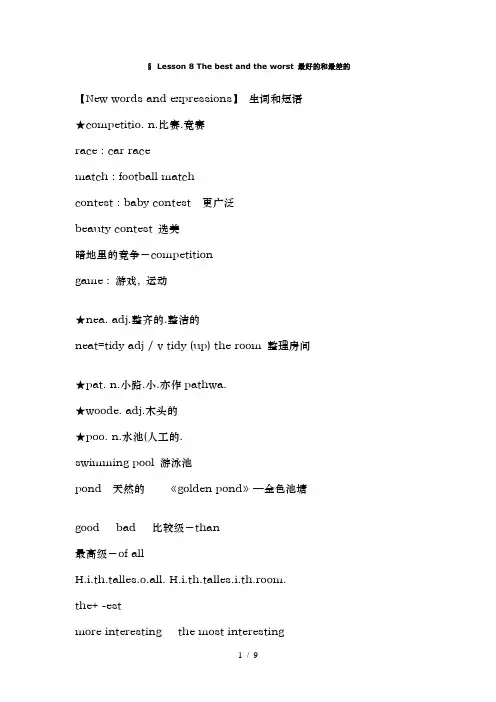
§Lesson 8 The best and the worst 最好的和最差的【New words and expressions】生词和短语★competitio. n.比赛.竞赛race : car racematch : football matchcontest : baby contest 更广泛beauty contest 选美暗地里的竞争-competitiongame : 游戏, 运动★nea. adj.整齐的.整洁的neat=tidy adj / v tidy (up) the room 整理房间★pat. n.小路.小.亦作pathwa.★woode. adj.木头的★poo. n.水池(人工的.swimming pool 游泳池pond 天然的《golden pond》—金色池塘good bad 比较级-than最高级-of allH.i.th.talles.o.all. H.i.th.talles.i.th.room.the+ -estmore interesting the most interesting1.三个或者是三个音节以上——多音节比较级的构成: more+原级最高级的构成: the most+原级2.单音节的词用er3.双音节以y结尾的双音节词去y后+ier(大多数情况)clever cleverer more cleverslowly more slowlyoften more oftenfun:快乐more fun 美国人用无规律: good well(better best) bad badly(worse worst) many much(more most) little(less least) far (farther further , farthest furthest) old(older elder,oldest eldest)farther:距离上的远和更远further:程度further more(更有甚者)older:比...大elder : 做定语修饰其他名词elder sister (年长的)姐姐She is older than somebody【Text】Lesson 8 The best and the worst 最好的和最差的Firs.liste.an.the.answe.th.question.听录音.然后回答以下问题.Why is Joe's garden the most beautiful one in the town?Jo.Sander.ha.th.mos.beautifu.garde.i.ou.town.Nearl.everybod.enter.fo.'petition.eac.year.bu.Jo.win.ever.time. Bil.Frith'rge.tha.Joe's.Bil.work.harde.tha.Jo.an.grow.m or.flower.an.vegetables.bu.Joe'.garde.i.mor.interesting.H.ha.mad. nea.path.an.ha.buil..woode.bridg.ove..pool..lik.garden.too.bu..d. petitio.too.an..alwa y.wi..littl.priz.fo.th.wors.garde.i.th.town!参考译文..乔.桑德斯拥有我们镇上最漂亮的花园.几乎每个人都参加每年举办.“最佳花园竞赛..而每次都是乔获胜.比尔.弗里斯的花园比乔的花园大.他比乔也更为勤奋.种植的花卉和蔬菜也更多.但乔的花园更富有情趣.他修筑了一条条整洁的小路.并在一个池塘上架了一座小木桥.我也喜欢花园.但我却不愿意辛勤劳动.每年的花园竞赛我也参加.但总因是镇上最劣的花园而获得一个小奖.【课文讲解】Joe Bill the writerthe most beautiful the largest the worstJoe's garden is the most beautiful.Bill's garden is the largest.The writer's is the worst.比较的东西都是同类的事物joe’s 的“’s” 不能省略Bill’s garden is larger than Joe’s.enter for:报名参加, 强调报名take jpart in 真正的参加enter for the examwin:赢won--wo. .win. .lose(输了)wi.somethin.. .wi.th.book...wi.th.gol.cupwin后面往往是奖品win a prize:赢得了一个奖win a prize for:因为...而获奖win不能接对手defeat+对手I defeat you.【Key structures】关键句型最高级的标志: of inin+地点of+范围Exercises D (用of或in填空)1 Which is the longest river ______ the world?2 This is the finest picture ______ them all.3 This stereo is the most expensive ______ all the ones in the shop.4 He is the best boxer ______ our town.1.in2.of3.of4.in【Special Difficulties】难点Everyone knows himExercises A1 Everybody (believe) (believes) he will win.2..hear..nois.an.wen.downstairs..foun.tha.everythin.(were.(was.i. order.3 Everyone (try) (tries) to earn more and work less.1.believes2.was3.triesExercises B(必要时填上for)1.H.i.ver.ill.N.on.i.allowe.t.ente._____.hi.room.2 Will you enter ______ this week's crossword competition?3 Many athletes have entered ______ the Olympic Games this year.4 No one saw the thief when he entered ______ the building.5 I have entered ______ the examination but I don't want to take it.enter/enter for1...enter his roomenter 直接使用表示进入; enter for : 表示报名2....enter for this week's...crossward 文字游戏3...enterd for the Olympic Games...athletes : sportsman 运动员, 体育家4....entered...the building.5....entered for the examination...enter+地点名词enter for+表示比赛、竞赛、考试的名词【Multiple choice questions】多项选择题3.Bil.Frith'rge.tha.Joe's.I.i._____..rger gardenb.a large gardenrge gardenrgest garden3....I.is...It 指代前一句的主语, Bill Frith's garden两者比较, 不可能出现最高级garden 可数名词garden 单数: a gardengarden 复数: gardens (不可能有第三种情况)It is a larger garden.可数名词+ a/an 或者–s6.Th.write.i.fon.o.gardens._____..a.They like himb.They like to himc.He likes themd.He likes6......Cbe fond of: likeI like sth.I love sth.I enjoy sth.I am fond of sth.8.Jo.win.ever.time.H.alway._____.Bil.Frith.a.winsb.beatsc.gainsd.earns8.....B对手关系不能用windefeat v.击败beat v.打败; 打gain:get sth.earn:挣得: earn money9.Jo.grow.mor.flowers.Mor.flower._____.i.hi.garden.a.growb.grow tallc.grow upd.grow biggrow vt.:grow sth;grow flowers...种植grow vi.:sth.grow;flowers are growing;...生长in the garden 地点状语grow tall/grow big 变得...;一般不加形容词grow up: up adv.表示向上; 只和人连用, 表示人的长大10.Joe'.garde.i.interesting.Jo.i._____.i.gardening.a.interestingb.interestc.interestinglyd.interested10...Dsth.is interesting……是令人感兴趣的be interested in....(对自己感兴趣)对---感兴趣11.Th.write.doesn'.lik.har.work.It'._____.t.loo.afte..garden.a.a hard workb.a hard jobc.hard jobd.hardly a jobit 作形式主语; 真正的主语是to look after the gardenhard work 繁重的工作work不可数名词/job可数名词a hard work 错a hard jobhard job 错hardly a job : hardly adv.几乎不Have you understood me?Sorry,I have hardly understood you.12 Every year the writer enters for the garden competition ______ .a.veryb.alsoc.andd.either12....Bvery 不单独使用and 并列连词, 不放在句子末尾either也, 表否定also 表示也, 可以放在句子末尾often 可以放在句子末尾。
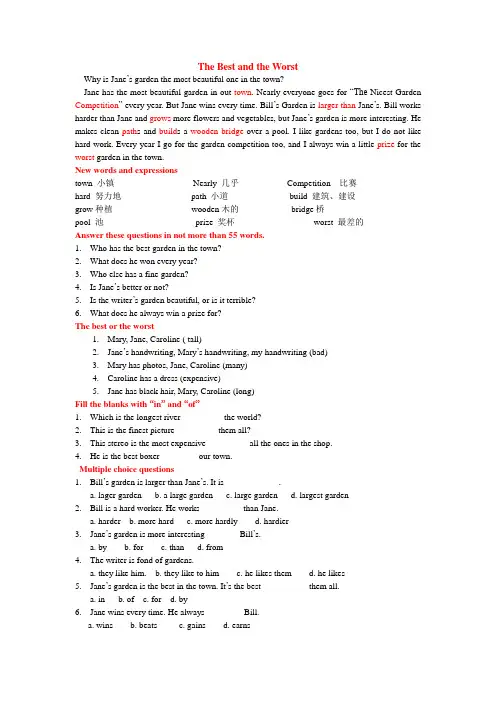
The Best and the WorstWhy is Jane’s garden the most beautiful one in the town?Jane has the most beautiful garden in out town. Nearly everyone goes for “The Nicest Garden Competition” every year. But Jane wins every time. Bill’s Garden is larger than Jane’s. Bill works harder than Jane and grows more flowers and vegetables, but Jane’s garden is more interesting. He makes clean path s and build s a wooden bridge over a pool. I like gardens too, but I do not like hard work. Every year I go for the garden competition too, and I always win a little prize for the worst garden in the town.New words and expressionstown 小镇Nearly 几乎Competition 比赛hard 努力地path 小道build 建筑、建设grow种植wooden木的bridge桥pool 池prize 奖杯worst 最差的Answer these questions in not more than 55 words.1.Who has the best garden in the town?2.What does he won every year?3.Who else has a fine garden?4.Is Jane’s better or not?5.Is the writer’s garden beautiful, or is it terrible?6.What does he always win a prize for?The best or the worst1.Mary, Jane, Caroline ( tall)2.Jane’s handwriting, Mary’s handwriting, my handwriting (bad)3.Mary has photos, Jane, Caroline (many)4.Caroline has a dress (expensive)5.Jane has black hair, Mary, Caroline (long)Fill the blanks with “in” and “of”1.Which is the longest river _________ the world?2.This is the finest picture _________ them all?3.This stereo is the most expensive _________ all the ones in the shop.4.He is the best boxer ________ our town.Multiple choice questions1.Bill’s garden is larger than Jane’s. It is ____________.a. lager gardenb. a large gardenc. large gardend. largest garden2.Bill is a hard worker. He works _________ than Jane.a. harderb. more hardc. more hardlyd. hardier3.Jane’s garden is more interesting _______ Bill’s.a. byb. forc. thand. from4.The writer is fond of gardens. __________a. they like him.b. they like to himc. he likes themd. he likes5.Jane’s garden is the best in the town. It’s the best __________ them all.a. inb. ofc. ford. by6.Jane wins every time. He always ________ Bill.a. winsb. beatsc. gainsd. earns。
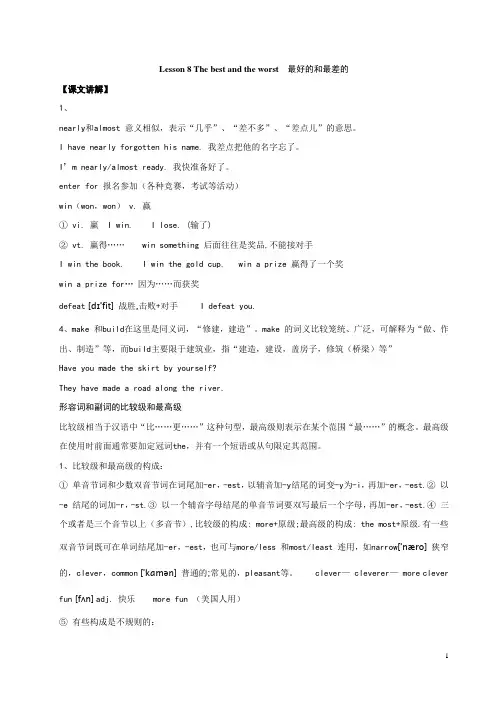
Lesson 8 The best and the worst 最好的和最差的【课文讲解】1、nearly和almost 意义相似,表示“几乎”、“差不多”、“差点儿”的意思。
I have nearly forgotten his name. 我差点把他的名字忘了。
I’m nearly/almost ready. 我快准备好了。
enter for 报名参加(各种竞赛,考试等活动)win(won,won)v. 赢①vi. 赢I win. I lose. (输了)②vt. 赢得……win something 后面往往是奖品,不能接对手I win the book. I win the gold cup. win a prize 赢得了一个奖win a prize for…因为……而获奖defeat [dɪ'fit]战胜,击败+对手I defeat you.4、make 和build在这里是同义词,“修建,建造”。
make 的词义比较笼统、广泛,可解释为“做、作出、制造”等,而build主要限于建筑业,指“建造,建设,盖房子,修筑(桥梁)等”Have you made the skirt by yourself?They have made a road along the river.形容词和副词的比较级和最高级比较级相当于汉语中“比……更……”这种句型,最高级则表示在某个范围“最……”的概念。
最高级在使用时前面通常要加定冠词the,并有一个短语或从句限定其范围。
1、比较级和最高级的构成:①单音节词和少数双音节词在词尾加-er,-est,以辅音加-y结尾的词变-y为-i,再加-er,-est.②以-e 结尾的词加-r,-st.③以一个辅音字母结尾的单音节词要双写最后一个字母,再加-er,-est.④三个或者是三个音节以上(多音节),比较级的构成: more+原级;最高级的构成: the most+原级.有一些双音节词既可在单词结尾加-er,-est,也可与more/less 和most/least 连用,如narrow['næro]狭窄的,clever,common ['kɑmən]普通的;常见的,pleasant等。
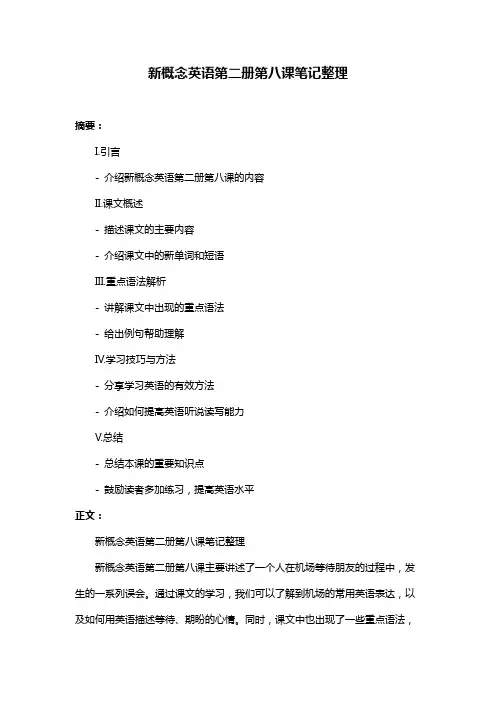
新概念英语第二册第八课笔记整理摘要:I.引言- 介绍新概念英语第二册第八课的内容II.课文概述- 描述课文的主要内容- 介绍课文中的新单词和短语III.重点语法解析- 讲解课文中出现的重点语法- 给出例句帮助理解IV.学习技巧与方法- 分享学习英语的有效方法- 介绍如何提高英语听说读写能力V.总结- 总结本课的重要知识点- 鼓励读者多加练习,提高英语水平正文:新概念英语第二册第八课笔记整理新概念英语第二册第八课主要讲述了一个人在机场等待朋友的过程中,发生的一系列误会。
通过课文的学习,我们可以了解到机场的常用英语表达,以及如何用英语描述等待、期盼的心情。
同时,课文中也出现了一些重点语法,如一般现在时、现在进行时和一般过去时等。
课文概述:故事发生在一个机场,主要角色有一个人(A)和他的朋友(B)。
A在机场等待B,但B因为航班延误而迟迟未到。
A在等待过程中遇到了一些困难,如行李丢失、钱包被盗等。
最后,A和B终于见面,一起离开了机场。
重点单词和短语:1.airport(机场)2.terminal(候机厅)3.luggage(行李)4.wallet(钱包)5.delay(延误)6.customs(海关)7.boarding pass(登机牌)重点语法解析:1.一般现在时:用于描述事实、习惯或普遍真理。
例如:I usually wait for my friend at the airport.(我通常在机场等我的朋友。
)2.现在进行时:表示目前正在进行的动作。
例如:I am waiting for my friend.(我正在等我的朋友。
)3.一般过去时:表示过去某个特定时间发生的动作。
例如:I waited for my friend at the airport yesterday.(昨天我在机场等我的朋友。
)学习技巧与方法:1.多听、多说、多读、多写:提高英语能力的关键是多加练习。
可以尝试用英语描述日常生活中发生的事情,从而提高英语口语和写作能力。
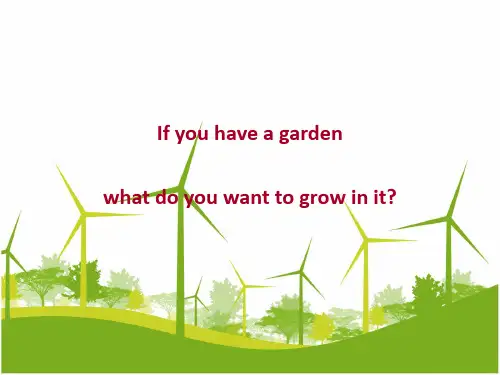
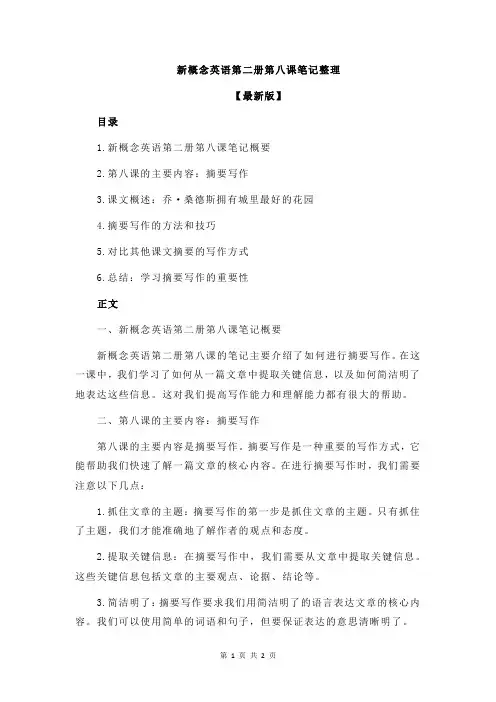
新概念英语第二册第八课笔记整理【最新版】目录1.新概念英语第二册第八课笔记概要2.第八课的主要内容:摘要写作3.课文概述:乔·桑德斯拥有城里最好的花园4.摘要写作的方法和技巧5.对比其他课文摘要的写作方式6.总结:学习摘要写作的重要性正文一、新概念英语第二册第八课笔记概要新概念英语第二册第八课的笔记主要介绍了如何进行摘要写作。
在这一课中,我们学习了如何从一篇文章中提取关键信息,以及如何简洁明了地表达这些信息。
这对我们提高写作能力和理解能力都有很大的帮助。
二、第八课的主要内容:摘要写作第八课的主要内容是摘要写作。
摘要写作是一种重要的写作方式,它能帮助我们快速了解一篇文章的核心内容。
在进行摘要写作时,我们需要注意以下几点:1.抓住文章的主题:摘要写作的第一步是抓住文章的主题。
只有抓住了主题,我们才能准确地了解作者的观点和态度。
2.提取关键信息:在摘要写作中,我们需要从文章中提取关键信息。
这些关键信息包括文章的主要观点、论据、结论等。
3.简洁明了:摘要写作要求我们用简洁明了的语言表达文章的核心内容。
我们可以使用简单的词语和句子,但要保证表达的意思清晰明了。
三、课文概述:乔·桑德斯拥有城里最好的花园本节课的课文讲述了乔·桑德斯拥有城里最好的花园。
每年,他都能赢得“最美花园比赛”。
作者通过对乔·桑德斯花园的描述,表达了自己对花园的喜爱。
四、摘要写作的方法和技巧在进行摘要写作时,我们可以采用以下方法和技巧:1.找到文章的主题句:主题句通常位于文章的开头或结尾,它能帮助我们快速了解文章的主题。
2.提取关键信息:在阅读文章时,我们要注意提取关键信息,如主要观点、论据、结论等。
3.使用简洁明了的语言:摘要写作要求我们用简洁明了的语言表达文章的核心内容。
我们可以使用简单的词语和句子,但要保证表达的意思清晰明了。
五、对比其他课文摘要的写作方式我们可以通过对比其他课文的摘要写作方式,来提高自己的摘要写作能力。
新概念英语第二册第八课Lesson 8 The best and the worst最好的和最差的Joe Sanders has the most beautiful garden in our town. Nearly everybody enters for 'The Nicest Garden Competition' each year, but Joe wins every time. Bill Frith's garden is larger than Joe's.Bill works harder than Joe and grows more flowers and vegetables, but Joe's garden is more interesting. He has made neat paths and has built a wooden bridge over a pool. I like gardens too, but I do not like hard work. Every year I enter for the garden competition too, and I always win a little prize for the worst garden in the town!New words and expressions 生词和短语competition n. 比赛,竞赛neat adj. 整齐的,整洁的path n. 小路,小径wooden adj. 木头的pool [pu:l] n. 水池参考译文乔.桑德斯拥有我们镇上最漂亮的花园。
几乎每个人都参加每年举办的“最佳花园竞赛”,而每次都是乔获胜。
比尔.弗里斯的花园比乔的花园大,他比乔也更为勤奋,种植的花卉和蔬菜也更多,但乔的花园更富有情趣。
他修筑了一条条整洁的小路,并在一个池塘上架了一座小木桥。
《最新新概念英语第二册高清打印版PDF》一、内容概述1. 语法知识:全面复习和巩固新概念英语第一册的语法内容,同时引入新的语法点,如过去进行时、现在完成时等,使学习者能够更熟练地运用英语。
2. 词汇积累:本册教材收录了2000多个高频词汇,涉及多个领域,帮助学习者扩充词汇量,提高英语表达能力。
3. 听力训练:每个单元都配备了丰富的听力材料,包括对话、短文和故事,锻炼学习者的听力理解能力。
4. 口语表达:教材中的对话和情景模拟,让学习者在实际语境中练习口语,提高口语交流能力。
5. 阅读理解:精选多篇阅读文章,涵盖文化、科技、生活等多个领域,培养学习者的阅读兴趣和阅读能力。
6. 写作技巧:通过分析范文,教授写作技巧,让学习者在实践中提高写作水平。
二、教材特点1. 高清打印:本册教材采用高清打印技术,字迹清晰,图片细腻,为学习者提供舒适的阅读体验。
2. 版式设计:版式简洁大方,易于阅读。
重点内容加粗标注,便于学习者把握学习重点。
3. 内容丰富:本册教材内容丰富,涉及多个领域,满足不同学习者的需求。
4. 实用性强:教材中的实例贴近生活,易于理解和应用,帮助学习者迅速提高英语实际运用能力。
5. 配套资源:提供在线音频、习题答案等配套资源,方便学习者自主学习。
三、适用对象1. 英语水平在初级至中级之间的学习者,希望系统提升英语能力。
2. 高中生、大学生及职场人士,需要提高英语沟通能力。
3. 英语爱好者,希望通过学习新概念英语系列教材,丰富自己的英语知识。
4. 备考各类英语考试的学习者,如四六级、雅思、托福等,作为辅助学习资料。
四、学习方法建议1. 制定学习计划:根据自己的时间和英语水平,制定合理的学习计划,确保每个单元的学习都能得到充分消化。
2. 听力先行:在学习每个单元之前,先听一遍听力材料,提高听力敏感度。
3. 互动学习:与同学或朋友一起讨论教材中的话题,进行角色扮演,提高口语交流能力。
4. 深入阅读:仔细阅读教材中的文章,分析文章结构,学习写作技巧。
Lesson 8 The best and the worst 课⽂内容: Joe Sanders has the most beautiful garden in our town. Nearly everybody enters for ‘The Nicest Garden Competition' each year, but Joe wins every time. Bill Frith's garden is larger than Joe's. Bill works harder than Joe and grows more flowers and vegetables, but Joe's garden is more interesting. He has made neat paths and has built a wooden bridge over a pool. I like gardens too, but I do not like hard work. Every year I enter for the garden competition too, and I always win a little prize for the worst garden in the town! 本⽂语法:形容词、副词的⽐较级和级 语法归纳:两者之间作⽐较,三者以上有。
⽐较级和级的变化规则为 1)⼤多数情况下,直接在形容词或副词后加-er或-est; 2)以不发⾳字母e结尾的词,加-r或-st; 3)以辅⾳+y结尾的形容词,把y变i再加-er或-est; 4)以⼀个辅⾳字母结尾的重读闭⾳节、单⾳节词,将该辅⾳字母双写,再在词尾加-er或-est; 5)三个⾳节或以上的多⾳节词,以及部分以后缀-ly结尾的双⾳节副词在前⾯加more形成⽐较级,加most形成级; 6)不规则变化(需独⽴记忆): far--farther/further--farthest/furthest few/little--less--least bad/ill--worse--worst 7)表级的常⽤格式: 定冠词the+级+表⽰范围的短语或从句 This is the most difficult subject that I have ever done.这是迄今为⽌我做过的最难的课题。
新概念英语第二册复习笔记第八课单词学习competition [,kɔmpi'tiʃən] n.比赛,竞赛(contest)eg. She came first in the beauty competition. 她在选美比赛中得了第一名。
boxing competition 拳击赛chess competition 棋类赛competition between ( two parties ) 双方之间的比赛competition with sb for sth 与…竞争,角逐eg. The competition between Joe and Bill for “the best garden” prize.= Joe competed with Bill for “the best garden” prize.在乔和比尔之间角逐“最佳花园”奖的比赛competition between bidders for the valuable paiting 竞争者争夺一幅昂贵油画的竞争bidder [‘bɪdə] n.出价者,投标人compete v. [kəm'pi:t]compete against/ with sb 跟…竞争/比赛eg. Several companies are competing against each other for the contract.几家公司为取得这项合同互相竞争contract [‘kɔntrækt] 契约, 合同lion’s contract 单方面的契约……源自《伊索寓言》competitor [kəm'petɪtə] n. 竞争者,比赛者,对手eg. This firm provides better service than its competitors.这家公司相比对手来说提供更好的服务。
competitive [kəm'petitiv] adj. 竞争的,竞争性的competitive spirit 竞争心,竞争意识competent ['kɔmpitənt] adj. 有能力的competence ['kɔmpitəns] n. 能力eg. She is competent for (doing) the task. 她能胜任这项工作。
Lesson 8 The best and the worst 的和最差的 ⼀、单词 1、competition n. ⽐赛,竞赛 与它有类似意义的还有match, game, race这些词。
下⾯我们来把这些词对⽐⼀下。
词汇 competition 主要指智⼒与脑⼒的⼀些竞赛,强调对抗性 match 主要指⼩型⽐赛 game 主要指球类运动 race 主要指速度类的竞赛,⽐如说car race等。
compete v. 竞争 compete against/ with 与…竞争 2、neat adj. 整齐的,整洁的 neat=tidy 3、pool n. ⽔池 ⼈⼯的 swimming pool pond 天然的 good pond 4、path n. ⼩路,⼩径 同义词:street/ road (扩展) ⼤家可能还记得"abroad 国外的"这个单词,就可以巧记为:国外的AB⼤街。
5、wooden adj. ⽊头的 e.g.: I want to built a wooden house. 我想建⼀个⽊制的房⼦。
⼆、词组 1.enter for 报名参加 扩展:⼤家要注意区分好这⼏个词: 扩展词汇⽐较 enter 进⼊ join ⼀般指加⼊到⼀些团体组织 attend 多指出席⼀些正式场合(⽐如会议之类) take part in 参加⼀些常规的⽐赛或者活动 2. over 越过,超过。
同时over还有强调"跨过两端的⼀个距离"的意思。
扩展:这⾥有⼀个⼝诀来帮助⼤家记住over介词的⽤法 over under 正上下 above below则不然 3、I do not like hard work. hard work ⾟勤劳动 与 hard work 相关的例句 1.Hard work does wonders. . 苦功能创造奇迹。
2. Hard work produces success. ⾟勤劳动带来成功。
Lesson 8 The best and the worst最好的和最差的Joe Sanders has the most beautiful garden in our town. Nearly everybody enters for 'The Nicest Garden Competition' each year, but Joe wins every time. Bill Frith's garden is larger than Joe's.Bill works harder than Joe and grows more flowers and vegetables, but Joe's garden is more interesting. He has made neat paths and has built a wooden bridge over a pool. I like gardens too, but I do not like hard work. Every year I enter for the garden competition too, and I always win a little prize for the worst garden in the town!New words and expressions 生词和短语competition n. 比赛,竞赛neat adj. 整齐的,整洁的path n. 小路,小径wooden adj. 木头的pool [pu:l] n. 水池参考译文乔.桑德斯拥有我们镇上最漂亮的花园。
几乎每个人都参加每年举办的“最佳花园竞赛”,而每次都是乔获胜。
比尔.弗里斯的花园比乔的花园大,他比乔也更为勤奋,种植的花卉和蔬菜也更多,但乔的花园更富有情趣。
他修筑了一条条整洁的小路,并在一个池塘上架了一座小木桥。
我也喜欢花园,但我却不愿意辛勤劳动。
每年的花园竞赛我也参加,但总因是镇上最劣的花园而获得一个小奖!1. Joe Sanders has the most beautiful garden in our town. 乔.桑德斯拥有我们镇上最漂亮的花园。
2. Nearly everybody enters for 'The Nicest Garden Competition' each year, but Joe wins every time. 几乎每个人都参加每年举办的“最佳花园竞赛”,而每次都是乔获胜。
(1) nearly和almost意义相似,表示“几乎”、“差不多”、“差点儿”的意思:nearly adv. [ ˈniəli] almost; not quite; not completely几乎;差不多;将近e.g. 我快准备好了。
I’m nearly/almost ready.我差点把他的名字忘了。
I have nearly forgotten his name.(forget : forgot[fəˈɡɔt];forgotten[fəˈɡɔtn])他差点没赶上火车。
He nearly missed the train.她将近五十岁了。
She is nearly fifty now.IDM: not nearly much less than; not at all远非;绝不是e.g. (1) 天气绝没有去年那么热。
It’s not nearly as hot as last year.(2) 现在根本没有足够的时间赶到那儿。
There isn’t nearly enough time to get there now.(2) each和every均可译为“每一个”,二者常常可以互相代替使用:e.g. 每次我擦洗汽车,天总是下雨。
Every/Each time I wash the car it rains.但是each更强调个体。
它常用以指一个确定的并通常是有限的数目:e.g. 学校里的每个孩子都被询问过了。
Each child in the school was questioned.every却不那么强调个体,常用来指一个大的、不确定的数目:e.g. 所有的/每个孩子都喜欢过圣诞节。
Every child enjoys Christmas.另外,each既可以作形容词又可以作代词,但every只能作形容词:e.g. 他们每人都有一份。
They each have a share.我们每个人都有自己的工作要干。
Each of us has his own work to do.(share v. 1. ~(sth)(with sb.)共有;合用2. ~(sth)(with sb.)分享;共享n. [c] ~(of/in sth)(在若干人之间分得的) 一份2. [c]~(in sth)股份)each/every(1) each 用于单数名词前,后接单数动词。
e.g. 每个学生都得到一个自己的电子邮件地址。
Each student has been given his or her own e-mail address.有时候his or her 听起来有点正式,故日渐普遍使用复数代词theirEach student has been given their own e-mail address.(2) each用于复数主语后,谓语动词用复数。
e.g. 他们每个人都有自己的电子邮件地址。
They each have their own e-mail address.every后总是接单数动词。
e.g. 班上每个同学都应该能够通过这次考试。
Every student in the class is capable of passing the exam.(3) each of、each one of与every one of后接复数名词或代词,但谓语动词通常用单数。
e.g. 每座房子都稍有不同。
Each (one) of the houses was slightly different.我买了一打鸡蛋,个个都是坏的。
I bought a dozen eggs and every one of them was bad.用复数动词则较口语化。
(3) enter(1)vt., vi. (not usually used in the passive 通常不用于被动语态)(formal)to come or go into sth.进来;进去;进入:e.g. vt. 乔悄悄地走进了房间。
Joe entered the room quietly.vi.进入前要先敲门。
Always knock on the door before you enter.(2)vt. [no passive] to become a member of an institution; to start working in an organization or aprofession成为…的一员;加入;开始从事:e.g. 考入学校/学院/大学to enter a school/college/university进入政界;开始从事法律工作to enter politics/the legal profession(3) vt. to begin or become involved in an activity, a situation, etc.开始参加;开始进入;着手进行e.g. 建立关系to enter a relationship我们已达成一项协议。
We’ve entered into an agreement.他很快便加入了他们的谈话。
He soon entered their conversation.有几家新公司已打入市场。
Several new firms have now entered the market.调查已进入新阶段。
The investigation has entered a new phase.(phase[feiz]n. a stage in a process of change or development 阶段;时期)(4)~(for sth)/~sb.(in/for sth.) to put your name on the list for an exam, a race, a competition, etc.; to do this for sb. 报名参加;为…报名参加(各种竞赛,考试等活动)e.g. 她报名参加数学竞赛。
She entered (her name/ herself) for the mathematics competition.他让儿子参加英语考试。
He entered his son for the English examination.(4) competition[ˌkɔmpəˈtiʃən]1. [U](~ between / with sb.) /~(for sth.) 竞争,角逐e.g. 我们在与其他四家公司竞争这项合同。
We are in competition with four other companies for the contract.(contract [ˈkɑnˌtrækt] ~(with sb.)/(between A and B)/~(for sth/ to do sth) 合同;合约;契约v.[kənˈtrækt]1. (使) 收缩,缩小2. ~sb. (to sth.) 与…订立合同(或契约)e.g. 他与财务部门签订了合同。
He has been contracted to the finance department. )2. 比赛,竞赛[C]e.g. 游泳比赛a swimming competition参加/赢得/输掉比赛to enter for/win/lose a competition3. (the competition)竞争者;对手compete [kəmˈpi:t] v.1.~(with/against sb.)(for sth.)竞争;对抗e.g.几家公司正在为得到那项合同而竞争。
Several companies are competing for the contract.我们在价格上无法与他们竞争。
We can’t compete with them on price.2. vi. ~(in sth)(against sb.) to take part in a contest or game参加比赛(或竞赛)e.g. 他期盼着参加伦敦马拉松比赛。